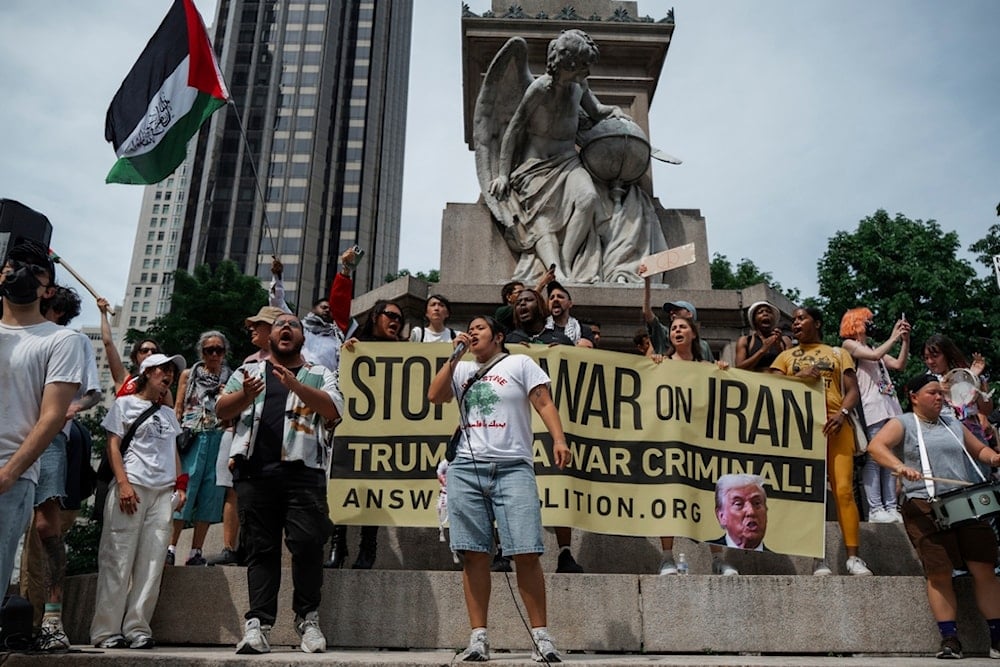US issues global travel warning for citizens after aggression on Iran
The US urges citizens to exercise caution abroad as the Israeli occupation's war against Iran and the US strikes on the country disrupt travel and stoke anti-American sentiment across key regions.
-

People shout slogans during a protest against US strikes on Iran, on Sunday, June 22, 2025, in New York. (AP)
The US State Department has issued a rare worldwide caution advisory urging American citizens abroad to exercise heightened vigilance, as the ongoing war the Israeli occupation is waging against Iran triggers disruptions and anti-US sentiment across multiple regions.
In a statement issued Sunday, the State Department cited the growing instability in the Middle East and the increasing threat of demonstrations targeting US citizens and interests. “The conflict between Israel and Iran has resulted in disruptions to travel and periodic closure of airspace across the Middle East,” the advisory read. “There is potential for demonstrations against US citizens and interests abroad. The Department of State advises US citizens worldwide to exercise increased caution.”
Worldwide Caution: The conflict between Israel and Iran has resulted in disruptions to travel and periodic closure of airspace across the Middle East. There is the potential for demonstrations against U.S. citizens and interests abroad. The Department of State advises U.S.… pic.twitter.com/PXJCvSHNxy
— Travel - State Dept (@TravelGov) June 22, 2025
The warning follows a broader advisory last week that discouraged travel to the occupied Palestinian territories, Gaza, and the West Bank, citing "armed conflict, terrorism, and civil unrest," sparked by the Israeli occupation's attacks and provocations since the beginning of the war on Gaza.
In Turkey, the advisory includes additional warnings for US government personnel, urging them to maintain a low profile and avoid personal travel to the country’s southern provinces. The alert notes that “negative sentiment toward US foreign policy may prompt actions against US or Western interests,” listing previous incidents such as anti-US demonstrations, boycotts, graffiti, and hostile rhetoric.
Trump stokes anti-US sentiment
The renewed global alert comes in the wake of US President Donald Trump’s decision to launch military strikes against Iranian nuclear facilities in what has been dubbed Operation Midnight Hammer. The bombing campaign marked a significant escalation in the war and sparked threats of retaliation from Iran.
In response, US diplomatic missions and security agencies have tightened monitoring of potential threats worldwide. The State Department advised Americans planning to travel overseas to review destination-specific travel advisories and register with the Smart Traveler Enrollment Program (STEP) for timely security updates.
The travel alert system, managed by the State Department, classifies risk levels from Level 1 (“Exercise Normal Precautions”) to Level 4 (“Do Not Travel”). Current Level 4 advisories include not only the occupied Palestinian territories, Gaza, and parts of the West Bank, but also other conflict zones where US citizens face heightened risk due to military hostilities or political instability.
Washington's calculated deception
The strikes follow what many now understand to be a deliberate deception by the US administration. While Trump made public gestures about diplomacy, The Atlantic revealed that military action had already been greenlit behind closed doors, in step with Israeli provocations.
Former UN weapons inspector Scott Ritter described the operation as "a grand act of theater," noting that Iran had preemptively secured its critical nuclear assets. "Nothing of significance was accomplished," Ritter said, pointing instead to Trump's political desperation as the true motive.
Iranian authorities have rejected the US narrative of victory and confirmed that their peaceful nuclear program remains intact. Foreign Minister Abbas Araghchi warned that the United States and "Israel" had crossed a "very big red line" and would be met with a response "by all means necessary."
Read more: Iran says US, 'Israel' crossed 'red line' as Araghchi heads to Moscow
As part of its strategic posture, Iran's Shura Council has recommended the closure of the Strait of Hormuz, a vital energy corridor for global markets. Iranian MP Esmail Kowsari emphasized that the option is "seriously on the table," pending final approval from the Supreme National Security Council. The move would send a clear signal that Tehran will not allow its sovereignty to be trampled without consequence.

 4 Min Read
4 Min Read








